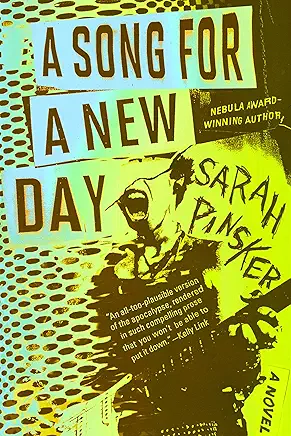
I don’t usually choose science fiction as a genre. However, this novel came to my attention because its author and critics called it “eerily prescient” when the 2020 pandemic government mandates began. Published in 2019, Pinsker focused on changes in the music industry and underground musicians. She chose to call an underground musicians’ enclave in Baltimore “The 2020.”
Rosemary, one of the protagonists, is a young adult who began attending school online when she was 13 and had little memory of the world of cities, crowds, and human interaction. When the author introduces her to the reader, we realize that Rosemary has worked at the helpdesk remotely for about six years for a company called Superwally, which seems like Amazon. She interacts with Avs (avatars) rather than images of real people. She only knows a virtual world, brought to her through hoodies, which provide a virtual reality existence. Living in a small community where her parents keep her isolated and safe, she has little knowledge of life “Before.” the world changed. The crash happened after a pandemic and multiple terrorist attacks occurred in the country. When one of her clients tries to reward her with exposure to a music concert that enhances her virtual world, she seeks new employment that requires real-life human experiences. The story progresses as She begins to confront realities that existed before the pox spread through the country. It becomes apparent that bomb threats and other violent episodes provided enough of an antecedent for music concerts and other large gatherings to become illegal.
Another protagonist, Luce Cannon, is a singer whose band gave the last concert before the shutdown of live music. Luce and Rosemary meet as Luce attempts to maintain live shows, and Rosemary navigates the “Before” world in the “After.” Rosemary is at first appalled that the musicians she meets violate congregation laws and seem to ignore all of the safety warnings about germs. However, the musicians she meets gradually help her realize that her upbringing was replete with fear and isolation. Music is the bridge that allows her to experience the human touch and navigate the world of human association without the barrier of hoodies and internet connections. Although crowds lead to panic attacks and new sensations, she realizes that there may be some value to what she had grown to avoid, even though face-to-face relationships lead to vulnerabilities.
Sarah Pinsker received the Nebula Award for the best novel of 2019. Her proposed society made me wonder about the new normal evolving on the tail of the 2020 pandemic and the simultaneous angst in an unsettled and sometimes violent America. Pinsker provided several thought-provoking situations and scenarios. Some thoughts I had while reading include:
What are the advantage and disadvantages of being disconnected from social media and the virtual world? People offline in the novel were considered almost cultish and called “noncomms.”
What are levels of protection and monitoring acceptable for private companies and government agencies? Pinsker’s story included “hoodspace” where everything was controlled, and humans were supposedly safe.
To what extent are we willing to accept conservation and automation? Veneers were common practice in Pinsker’s novel so that resources were used more efficiently.
Other themes included:
What is home?
What laws may go overboard in protecting citizens?
What are the ramifications of police surveillance of citizens and body camera surveillance of police?
What are the consequences of big business conglomerates tracking our online footprint?
Is there value to an invisible or virtual bubble?


